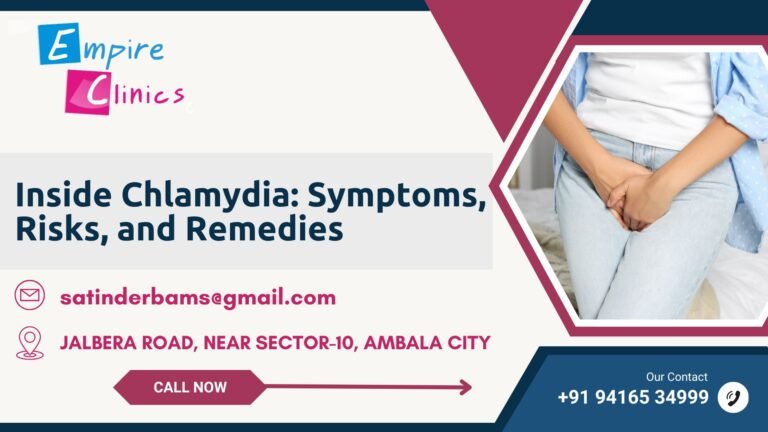Chlamydia is a common sexually transmitted infection (STD) caused by the bacterium Chlamydia trachomatis. It can affect both men and women and is known to be often asymptomatic. This article explores how to recognize chlamydia, how to prevent it and how to treat it effectively.
Symptoms
Chlamydia often goes unnoticed because many people have no symptoms. When symptoms do occur, they may differ between men and women and may vary in severity.
1. To Women
- Abnormal vaginal discharge: Women may notice an increase in vaginal discharge that does not have a normal color or odor.
- Burning sensation during urination: Burning during urination is a common symptom.
- Pelvic pain: Women may experience pain in the lower abdomen or pelvis, especially during intercourse.
- Bleeding between periods: Some women may see unusual bleeding between periods or after sex.
- Painful contact: Pain may occur during sexual activity.
2. To Men
- Penile discharge: Men may see a discharge from the penis that could be clear or cloudy.
- Burning sensation during urination: A burning sensation during urination is common in men.
- Painful testicles: Men may experience testicular pain or swelling.
- Urethral itching: Itching or irritation may occur at the tip of the penis.
3. In both sexes
- Rectal symptoms: If the infection affects the rectum, it may cause discomfort, discharge or bleeding.
- Throat symptoms: Oral sex can spread chlamydia to the throat, possibly causing a sore throat or discomfort.
Prevention
Chlamydia prevention includes several strategies to reduce the risk of transmission and maintain sexual health.
- Use condoms: Consistently and correctly use latex or polyurethane condoms during vaginal, anal, and oral sex to reduce the risk of chlamydia and other STIs.
- Regular tests: Get tested regularly, especially if you are sexually active with multiple partners or in high-risk situations.
- Mutual monogamy: Be in a mutually monogamous relationship with a partner who has tested negative for STDs to reduce your risk.
- Avoid sharing sex toys: Use condoms in sex toys or clean them thoroughly to prevent the spread of infections.
- Open Communication: Discuss your STD status and sexual health openly with your partners to prevent chlamydia transmission.
Treatment
Chlamydia is treated with antibiotics. Adherence to the prescribed treatment plan is essential to effectively treat the infection and prevent complications.
1. Antibiotics
- Azithromycin: Take a single dose of azithromycin to effectively treat chlamydia.
- Doxycycline: A seven-day course of doxycycline, taken twice daily, serves as another treatment option.
- Other antibiotics: Your healthcare provider can prescribe alternatives such as erythromycin or levofloxacin if necessary.
2. Important issues
- Complete the full course: Always complete the entire course of antibiotics, even if symptoms resolve before the medication is completed.
- Avoid sexual activity: Avoid sexual activity for at least seven days after starting treatment or until the infection is confirmed to be cured.
- Partner Therapy: Make sure sexual partners are also tested and treated to prevent re-infection and further spread.
- Subsequent test: Schedule a follow-up test to confirm that the infection is completely cleared.
Complications if not treated
If left untreated, chlamydia can lead to serious health complications:
- To women: Untreated chlamydia can cause pelvic inflammatory disease (PID), which leads to chronic pelvic pain, infertility, and an increased risk of ectopic pregnancy.
- For Men: Chlamydia can cause epididymitis, an inflammation of the tube at the back of the testicles, which can lead to infertility.
- In both sexes: Untreated chlamydia can lead to reactive arthritis and increase susceptibility to HIV.
Have any questions about Chlamydia, Contact Now
Get in touch now
It is a common STD that often goes undetected due to the absence of symptoms. Recognizing the symptoms, implementing effective prevention methods, and seeking early treatment are critical steps in managing and eradicating the infection. Regular STD tests, safe sex practices and open communication with sexual partners they are essential for the prevention and maintenance of overall sexual health. If you suspect you have or have been exposed to chlamydia, see a healthcare provider for appropriate testing and treatment.
Chlamydia Decoded: The Hidden Facts and How to Handle Them

